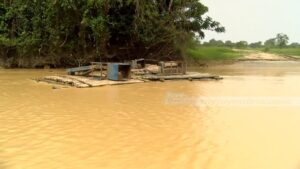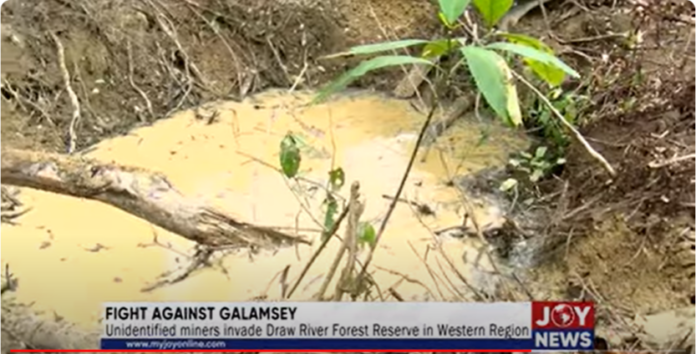Like many countries, Ghana faces many challenges, but one of the most urgent is the threat posed by illegal mining, widely known as “galamsey.”
While gold mining has been an integral part of Ghana’s history and economy, the unregulated and unauthorized extraction of gold along riverbanks and in forest reserves has left a trail of destruction.
Instead of reaping the rewards from its natural resources, Ghana, the once-proud “Gold Coast,” suffers from the consequences of illegal mining.
Many Ghanaians have ravaged the country’s natural reserves for decades, driven by unemployment, economic hardships, and greed.
Forests have been decimated, and water bodies polluted, leaving communities grappling with the fallout.
Galamsey not only destroys the environment but also endangers lives, as those who stand in opposition often face threats, violence, and even death.

In 2016, the nation was shocked by the tragic death of Major Maxwell Mahama, an army officer who was brutally murdered in Denkyira Obuasi in the Central Region while combating illegal mining.
This illegal activity has become so widespread that even cocoa farmers, traditionally the backbone of Ghana’s agricultural industry, have succumbed to selling their farms to galamsey operators.
When questioned, they cite financial desperation as their primary motivation.
The situation is so dire that religious leaders have taken to visiting galamsey sites, offering prayers for divine intervention to halt the destruction.
The problem is not confined to Ghanaians alone. Foreign nationals, particularly Chinese miners, have been implicated in these activities.
A notorious figure in this realm is Aisha Huang, who was deported in 2018 for illegal small-scale mining.
However, she reportedly re-entered Ghana under the alias En Huan and resumed her mining operations, demonstrating the complexity and persistence of this issue.
In 2017, President Nana Addo Dankwa Akufo-Addo pledged to make the fight against galamsey a national priority.
Military personnel, task forces, and river wardens were deployed to patrol the country’s water bodies, and while these efforts were commendable, galamsey remains rampant.
Cocoa farms have been destroyed, and once-clear rivers are now dangerously polluted, posing health risks to communities.
River Prah, for instance, has seen its turbidity levels skyrocket from an average of 5 MTU to an alarming 14,000 MTU, rendering its water poisonous for both drinking and farming.
Complicating the fight against galamsey are the political undercurrents that run through the issue.
Some politicians, in a bid to secure votes, have promised amnesty to illegal miners or turned a blind eye to their activities.
This has fueled the spread of galamsey and made it difficult for authorities to clamp down effectively.
Health professionals are sounding the alarm over the severe public health risks associated with illegal mining.

Contaminated water sources have been linked to a rise in kidney diseases and other serious health issues.
Instead of confronting the problem head-on, political parties have resorted to blaming each other, with accusations flying about who is responsible for polluting the country’s vital water resources.
Despite these challenges, there is a growing awareness among Ghanaians about the dire consequences of galamsey.
Traditional leaders like Asantehene Otumfuo Osei Tutu II have issued stern warnings to the government, calling for swift and decisive action.
Dormaahene Nana Agyemang Badu I has also expressed his firm opposition to galamsey, giving the government a one-month ultimatum to resolve the issue.
Additionally, unions have threatened to strike in a bid to pressure authorities to act against this destructive practice.
The devastation caused by illegal mining affects not only the residents of the areas where galamsey is rampant but also the entire nation.
The time for action is now. Ghanaians must set aside political affiliations and come together to combat galamsey before more irreversible damage is done.
The future of the nation depends on it.
Article by Ayisha Akua Ibrahim


